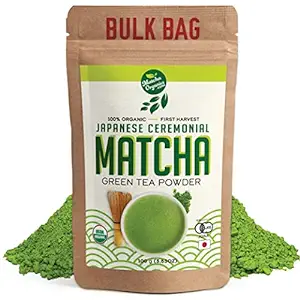Matcha, the finely ground powder of specially grown and processed green tea leaves, has been captivating health enthusiasts worldwide. But what does matcha do for your body and mind? Let's explore the science-backed benefits of this vibrant green superfood.

Key takeaways:
• Matcha is packed with catechins, powerful antioxidants that combat oxidative stress
• It may enhance cognitive function, improving memory and attention
• Matcha could promote heart health by reducing bad cholesterol levels
• Its compounds show potential for cancer prevention in laboratory studies
• Drinking matcha may support weight management efforts
Antioxidant powerhouse
At the core of matcha's health benefits are catechins, a class of plant compounds with strong antioxidant properties. The star player is epigallocatechin gallate (EGCG), which matcha contains in significantly higher concentrations than regular green tea[1].
These antioxidants help neutralize harmful free radicals in the body, potentially reducing the risk of chronic diseases. Research has shown that matcha contains up to 137 times more antioxidants than low-grade green tea and up to 3 times more than other high-quality teas[2].

Cognitive enhancement
If you're seeking a natural brain booster, matcha might be your answer. Studies suggest that matcha can improve various aspects of cognitive function[1].
A study published in the journal Food Research International found that participants who consumed matcha experienced improvements in attention, reaction time, and memory compared to a placebo group[1]. This cognitive-enhancing effect may be due to the synergistic interaction between caffeine and L-theanine, an amino acid that promotes relaxation without drowsiness.
Cardiovascular support
Your heart may benefit from that daily matcha latte. Several studies have linked green tea consumption to a reduced risk of heart disease, and matcha's concentrated nutrients may offer even greater advantages[1].
Research indicates that green tea catechins can help lower levels of LDL (bad) cholesterol while increasing HDL (good) cholesterol. Additionally, a study in hypertensive rats found that matcha reduced blood pressure and improved arterial function[1].
Potential cancer-fighting properties
While more research is needed, early studies on matcha's cancer-fighting potential are intriguing. The high concentration of EGCG in matcha has shown anti-tumor effects in laboratory studies[1].
One study found that matcha extract decreased tumor size and inhibited breast cancer cell progression in mice. Another in vitro study suggested that EGCG could help prevent lung cancer cell growth[1]. However, it's crucial to note that these studies were conducted in labs and animals, and more human research is necessary.
Weight management aid
For those mindful of their waistlines, matcha might offer a helpful boost. The combination of caffeine and EGCG in matcha has been shown to increase thermogenesis (the body's rate of burning calories) and fat oxidation[3].
A study published in the American Journal of Clinical Nutrition found that green tea extract rich in catechins like those found in matcha increased 24-hour energy expenditure and fat oxidation in men[3]. While matcha isn't a magic solution for weight loss, it could be a beneficial addition to a balanced diet and regular exercise routine.
How to incorporate matcha
To maximize the benefits of matcha, quality is key. Look for ceremonial grade matcha from reputable sources. Here are some ways to add it to your daily routine:
• Traditional matcha tea: Whisk 1 teaspoon of matcha powder with hot (not boiling) water
• Matcha latte: Blend matcha with your choice of warm milk and a touch of honey
• Smoothie boost: Add a teaspoon to your favorite smoothie recipe
• Culinary creations: Experiment with matcha in baked goods, energy balls, or even savory dishes
While matcha is generally safe for most people, it does contain caffeine. Those sensitive to caffeine or with certain medical conditions should consult a healthcare provider before adding matcha to their diet.
As research continues to uncover matcha's potential, this ancient tea is proving to be more than just a passing trend. From cognitive function to heart health, matcha offers a wide array of benefits that make it a valuable addition to a health-conscious lifestyle.
Remember, while matcha shows promise in many areas of health, it's not a cure-all. It's best used as part of a balanced diet and healthy lifestyle. As always, consult with a healthcare professional before making significant changes to your diet or supplement regimen.
Citations:
[1] https://www.ncbi.nlm.nih.gov/pmc/articles/PMC9792400/
[2] https://www.ncbi.nlm.nih.gov/pmc/articles/PMC7796401/
[3] https://matcha.com/pages/matcha-health-benefits
[4] https://matchasource.com/health-benefits-of-matcha-tea/
[5] https://www.healthline.com/nutrition/7-benefits-of-matcha-tea
[6] https://www.forbes.com/health/supplements/matcha-tea-health-benefits/















Member discussion